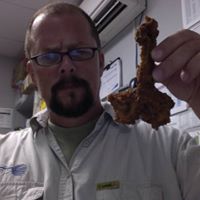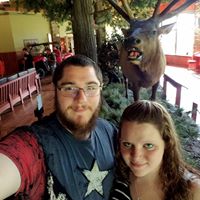Leaderboard
Popular Content
Showing content with the highest reputation on 08/21/2012 in all areas
-
Hey everyone. My EMT class just started and all is going well so far. I've been thinking about clinicals lately, and I just have one question. How do I lower anxiety so that I can make better "on the spot" decisions? I have a history of anxiety, and am trying to overcome it. Thank you.2 points
-
Hi Everyone - I’m Brandi and a new member. I’m an EMT Student hoping to meet others in the same boat and help push each other along. I’m also hoping to meet all the professional EMT members here as well and hopefully get some tips from all of you. I’m not even done with my training but I can already tell this is going to be a great field!2 points
-
Again, it all goes back to the adage "follow the money" But they couldn't have offered and given membership to two finer ladies. But I wonder why the CEO of IBM wasn't given membership?1 point
-
It's also, and in my opinion, mostly, about attitude. You need to adjust your attitude on how you feel about making errors, especially in front of others. In my experience students often try and appear more inept than they actually are, either consciously or subconsciously trying to lower the expectations of those around them so that less will be expected of them with the intent of "Doing better once I'm more comfortable." Every experience is an opportunity to get better, and stronger, but too often a students goal is simply to "get through." And this is a bad, but also, really scary place to be. And forget about speed. You will "perform as you practice" so practice as perfectly as you can. You can't do that fast. Should you make this a career you'll likely be able to count the number of patients 20 years from now that were positively effected because you got an IV in 30 seconds instead of 90 on one hand most likely. When you practice your skills, slow down. Place your hands an feet in the places that you want them to be with purpose and decide why you wanted them there. Slowly. Always focus on slowing down and doing everything correctly the very first time, you will naturally become quicker with time. In EMS you will gain speed by eliminating wasted steps, not by moving faster. Trust me on this. Focus on what YOU think is wrong or right in every scenario or patient contact. Understand that you are going to really suck in the beginning, and sucking is exactly where you're supposed to be in the beginning...there is no shame there. The shame should come when you discover that you've decided that you're to important to make mistakes. That mistakes are for others. That you're not committeed enough to put your best effort forward every time so that it can be judged and improved. I don't think that I've ever come away from a scenario or call and didn't think, "Dang it...I wish I would have done this sooner, or done that instead." I'm never uncomfortable now working in front of people because I'm confident that I've done my best to prepare, that I'll focused just on my tasks instead of wasting brain power wondering what others are thinking. I remember that I'm just a simple country paramedic..that I'm going to make mistakes, that is a certainty, but they won't be stupid mistakes made by trying to hurry, or appear super human, and that I will learn all that I can each time so hopefully make fewer next time. If you find yourself at any time thinking, "I don't know what to do, God, I'm such an idiot." Then understand that you're wasting your time, the time of those trying to help to educate you, and giving very poor patient care, because those thoughts are taking up the majority of your mental and emotional energy that should have been applied to succeeding instead. When you don't know what to do...slow down and ask more questions. When you're scared, confused and can't figure out the simplest thing...slow down more, get more information. When everyone around you is freaking out and telling you to hurry, slow down again, gather more information still, until you know the right thing to do. Action is never, ever a substitute for calm thought, though you will find that most around you feel that it is. Slow down, breath, think. You'll do awesome.1 point
-
Hello There Everyone! My name is Andrew. I am an EMT-B In NYS. I've been in this business for Four years (I'm Most likely a baby in some of your eyes), three as a certified EMT. I Work in a very, very high call volume (total near 90,000 calls per year for the company). I look foreward to interacting and getting to know Y'all. -Brotherlog63 (If you come to work and dont learn something new, you should most likely rethink what you are doing or how you are acting.)1 point
-
Just wanted to stop in a say HI. My name is Jason and I'm 25. I have currently applied to school to become a paramedic. My goal is to do both paramedic and firefighting. Been wanting to do this so I finally applied and now working towards my goal! Super excited and cant wait!1 point
-
Yeah it is, I just hate it reads me as a rookie, seriously. Wish there was a way I could link my posts from both names (had to change previously due to some major issues, which fortunately are resolved, but now it looks like I have two identies). Ugh ! I'm just smiling and sayin' LIFE IS GOOD1 point
-
This may be an unpopular response, but I've spent alot of time in very rural areas dealing with some very critical patients (ie times to basic ER may exceed an hour depending on where in the county I am and 2 + to definitive care). Many counties here carry basics only and medics are called for an intercept, or the county doesn't even have a hospital or the next one over has a 2 bed ER. No I am not talking about BFE, but we're pretty close to it. I was taught, even with urban which I spent a year doing just for a change of pace and even industrial. Do everything you can on the fly. Get the patient to the best possible care, and if it's not an adequate hospital, don't play around bypass it if the patient is stable enough and protocols allow. If not, fly 'em out. Don't make a critical patient sit for an hour or more in an inadequate ER and then get transferred and have all that transport time. It's not worth it. Of course making this decision is going to require much stronger diagnosing (oops we don't do that, we form opinions and treat those ) skills and you will find your skills getting much stronger because they will have to be. I love all my students to do rural rotations because it really does improve their skills and then when spending time in an urban environment with a hospital 15 minutes away they think they have it good. I'm definitely not fly happy, I think alot is flown that doesn't need to be, but I've also seen patients die or have poor outcomes that I suspect had they been in proper care earlier (ie cardiac and stroke patients) they would have been more successful. I'm not God, so I can't say that with certainty, but I would have been more aggressive. Of course, you have to work within protocols, but don't be afraid to push them a bit if it means better treatment for your patient. I'd rather explain why I flew out a stroke patient with known loss of function an hour ago than let them be transported an hour, then sit for an hour or more locally then get transferred the two hours. Forget that, if it makes someone mad, all well, they'll get over it. My patient got definitive care in about 30 min well within the 3 hour window. I'm happy and I'll explain that to a lawyer or my director anyday over why I didn't, and I'd never question my medic acting in the patient's best interest. Ultimately, keep your skills sharp, do everything on the fly, and if locally they can't take care of it, send them immediately to where can. Don't play around. Remember patient's first ! Act as if it was you or someone you loved, and likely, you'll never act wrong and they'll know they were treated with utmost respect which is HUGE in rural communities. These people likely will know you well and you'll deal with them alot. You'll know the good and the bad about them and if you always are respectful, you'll have a unique relationship that you just don't get urban. You'll do great I'm sure ! Take care and always be safe.1 point
-
Does your school require the students to partake in a field practicum? If so, subject all the students to a mandatory drug test, don't single out this one student. If, and when this student fails, make sure he is aware that even though he has a prescription for these pain killers, he can not work while under the influence of such. Until such time as he is able to perform his duties without the need for painkillers he will not be able to complete his practicum and will be required to provide samples during the training period. If he is using the pain killers for legitimate pain, then he shouldn't be working at all, he needs to heal first so he doesn't injure himself further. If he is abusing them, then he will not be able to complete his training until his rehab is complete. Most of all, be supportive. Give him an opportunity to sort himself out and return. I know a few great medics who have had to shrug that monkey off their backs....there are even some on this forum. Finally, none of us are lawyers. Get legal advice from one of them, not from me. My idea sounds good in my head, but I have no idea if it's legal where you are.1 point
-
The Ancient Order of Hibernians is a private organization, which runs a very public parade on NYC's 5th Avenue. I don't know if they pay for the NYPD and NYC Department of Sanitation overtime for security and post event cleanup, or if I am paying them through my taxes. The AOH always makes the news from mid February through March 17, when they (again!) refuse to allow any openly Gay, Lesbian, Cross Dressing, or Transgendered groups to march in "their" parade, the New York City Saint Patrick's Day Parade. As I already said, a private organization, which runs a very public parade. Disclosure: On St. Patrick's Day, I'm one of the "wannabe Irish", but in the one time I was in that parade, the EMS Chief in command of the contingent knew I had experience as a part of a colorguard, so I, a German-Polish-Russian 3rd Generation American Jew, formed a single person, second line of the colorguard, entrusted to carry the flag of Ireland.1 point




